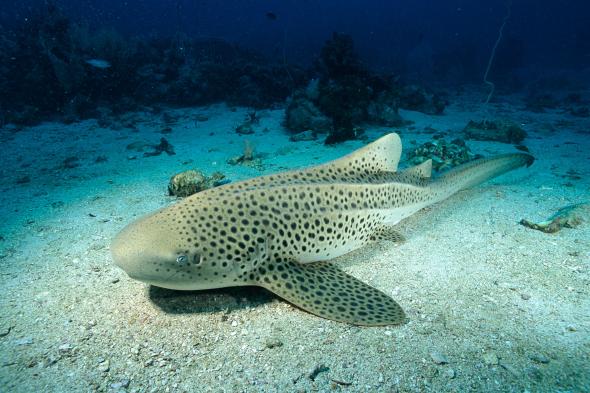A leopard shark in an aquarium in Australia surprises its keepers with the rare phenomenon as three pups born without father.
The zebra or leopard shark (Stegostoma fasciatum) is among the species that has now been observed giving “virgin birth.” PHOTOGRAPH BY FRED BAVENDAM, MINDEN PICTURES, NATIONAL GEOGRAPHIC
As Ian Malcolm famously said, “life finds a way.”
Aquarium keepers in Australia realized that this week, after a captive zebra shark (Stegostoma fasciatum) gave birth to three pups—without having had any contact with a male for years. (Zebra sharks are often called leopard sharks in Australia, but they are a different species from the leopard sharks found off the west coast of North America.)
The 20-something shark at Reef HQ Great Barrier Reef Aquarium in Townsville laid 41 eggs without a father. Three of them hatched into healthy pups, all female.
The pups were named Cleo, CC, and Gemini. Their mother is called Leonie.
Although this phenomenon of “virgin birth” is quite rare, it’s not unheard of in sharks. Virgin births have been observed in other sharks in aquaria and in the wild. It has also been seen in other types of animals, fromsnakes to invertebrates.
“We have seen this process, called parthenogenesis, in a number of shark species, particularly in aquaria,” says George Burgess, a shark expert with the Florida Museum of Natural History.
“I think it happens when they get pushed into an evolutionary corner, like in an aquarium with no males around,” says Burgess.
The upside is that life finds a way. The downside is loss of the genetic diversity that comes from mixing the DNA of two parents. Although there can be some reshuffling of a mother’s DNA during a virgin birth, the opportunities are more limited than with two parents.
The resulting pups may be less able to fight off infections or deal with life’s challenges.
Zebra sharks are found throughout the tropical Indo-Pacific, where they frequent coral reefs and sandy bottoms. They can reach a length up to 8.2 feet (2.5 meters).
“Sharks never cease to amaze us,” Burgess says.
Correction: An earlier version of this story indicated the wrong species of shark, thanks to confusion over common names. The correct species isStegostoma fasciatum. Follow Brian Clark Howard on Twitter and Google+.
Also Read: A virgin birth has been confirmed in a reticulated python — a first for the species




